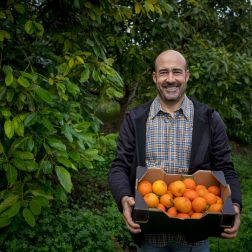- 4 mins read time
- Published: 4th April 2013
The sweet benefits of pineapples
Fresh pineapple is rich in vitamins and minerals. In Rwanda, its benefits are even sweeter for women farmers.
The home of Godelive Nyirabakobwa (58) in Nyakigandu village is neat and clean but sparse. The house has good walls and comfortable chairs with a single electric bulb hanging from a wire. To have electricity and a water tap at home is a sign that things are going well.
Life wasn’t always this way, however.

Clockwise from top: Godelive Nyirabakobwa in her pineapple field. Godelive Nyirabakobua says her pineapple suckers are sought-after as they’re locally grown rather than imported. Xaverine Mukarunyana (left), Godelive Nyirabakobua (middle) and Daphrose Nyirankundabanyanga (right) all grow and sell pineapple ‘suckers’ – high quality planting material needed by pineapple farmers. Photos: Simon Rawles/Oxfam.
“I’ve always been a farmer,” Godelive says. “Before now I was a beans and maize farmer until I learnt about pineapples. I moved here two years ago after living very far away in a rural place. I used to live a very bad life in the bush but today we are better off in this village. I had malaria all the time, actually so did my children and my husband. I could get a good harvest but we had no access to healthcare or good water.”
Thanks to an Oxfam-supported project, Godelive and 800 other women have set themselves up as pineapple sucker growers and sellers. Pineapple suckers are what pineapple plants, and eventually the fruit, grow from. They are the starting point for any pineapple product.
“In the training I learnt how to multiply the suckers, how to care for them and the new technique. We’re using it as the new way to make the suckers. In the old way we just planted all the crops up together but now we grow bananas and pineapples separately. It means it’s a lot better to farm and they grow well. Now I can weed and harvest easily.”
In the past, pineapple farmers in Rwanda have been reliant on buying suckers from other neighbouring countries such as Uganda. Due to the distances travelled the quality was unreliable, it raised their costs and plant disease was common.
With growing national demand for suckers as more people move into pineapple production due to government agricultural support, we spotted a new work opportunity for farmers living in poverty, particularly women. Instead of families trying to grow crops on small areas of land and getting very small yields, a different use of the same land could bring much higher returns.
“People come to me to buy suckers because they know they are free from disease and are good. Sometimes we use products to protect the suckers from disease and I’m vigilant; if I see suckers which are infected I remove them and throw them away so they aren’t among the others which aren’t affected.
“For me, I think soon I will be calm, as all my life will be resolved. In my heart I’ll be happy because I will be eating pineapple and drinking the juice. Personally I tell any woman not to be afraid. Start growing pineapples and I’ll show you how to do it and how to open your own bank account.”
Godelive is firmly focused on developing her business plans and improving life for her family.
“I feel like an entrepreneur because one day I sat and thought: ‘what if I get pineapple suckers, multiply them and try to generate income from them?’, and I got pineapple plants, divided each into four suckers and grew them.”
The success of Godelive and her fellow female farmers has had a wider impact beyond their fields.
“Now the women in Rwanda today are more open,” she explains. “In the past it used to be that if you wanted to start something you had to wait for your husband’s approval to start. Today any of us can just start something.”
Supporters across the island of Ireland are helping to support this project and others like it in Rwanda. Thank you for making a positive difference.




